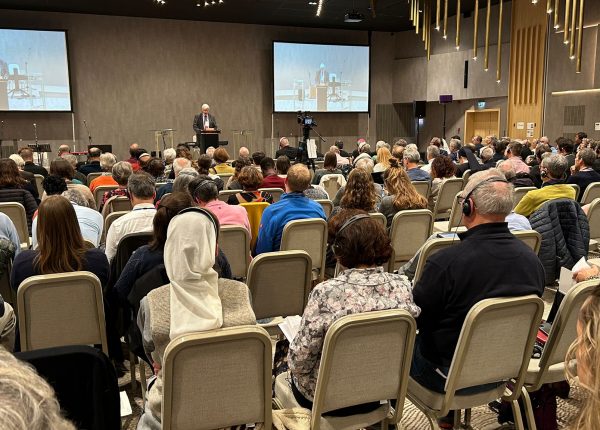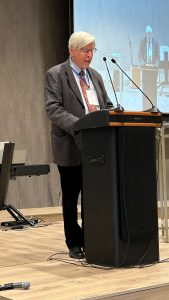“What is the role of Christian communities in Europe today?”, Interview with prof. Philip McDonagh

In the complex sociopolitical context that Europe is currently experiencing, leaders of Together for Europe (Insieme per Europa) gathered from November 16-18, 2023 in Timisoara, Romania, to address an important question, “What is the role of Christian communities in Europe today?” This question has gained relevance in the face of global issues such as various ongoing conflicts, migration dynamics, and the climate crisis.
 As part of the EU-funded DialogUE project, the annual “Together for Europe” meeting also addressed issues aimed at developing advice and recommendations for EU social policies. Professor Philip McDonagh, a former Irish diplomat and director of the “Center for Religion, Human Values and International Relations” at Dublin City University (DCU) stressed the importance of Article 17 of the Treaty on the Functioning of the European Union (TFEU) and emphasized the contribution of Churches in public debate.
As part of the EU-funded DialogUE project, the annual “Together for Europe” meeting also addressed issues aimed at developing advice and recommendations for EU social policies. Professor Philip McDonagh, a former Irish diplomat and director of the “Center for Religion, Human Values and International Relations” at Dublin City University (DCU) stressed the importance of Article 17 of the Treaty on the Functioning of the European Union (TFEU) and emphasized the contribution of Churches in public debate.
You can now read a complete interview with prof. McDonagh.
What does Article 17 say and why is it important?
Article 17 provides for a structured dialogue between the European institutions, churches and faith communities. It’s unique in the world because it’s an open, transparent dialogue on the great questions of society.
From the point of view of the European Union, the great benefit is that this is a channel for dialogue, on the deep questions of society. A German jurist, Ernst-Wolfgang Böckenförde, spent many decades developing his analysis that political societies, democracies, depend on cultural conditions. You can’t pass a law saying “We will trust one another.” Trust has to be earned. It has to be created by initiatives and by education. So Article 17 is a perfect means of creating these conditions on which a good democracy depends. It’s very good for the churches and it’s very good for public authorities. The temptation for churches and faith communities is to be a little bit lost in their own internal world and Article 17 is a way out, it generates new forms of leadership within the churches. For public authorities, instead, the great danger is to be on a treadmill, from week to week, with no time to think about the high level values and Article 17 is an antidote to that. So it’s very good for both sides.
You mentioned transparent dialogue on great questions of society. How Christian communities and the European Union can work together?
Well, one very obvious answer is that Christian communities have social capitals. They have schools, hospitals, charities, which help people who may otherwise not be looked after very well. But I think that’s the easy answer. The more important answer is that the churches go back to the first principles and ask, what is life in society about? We have a bigger language. For example: hope. What is hope? What does it mean to live in hope, to act in hope? So that’s a philosophical contribution to the public debate.
If our high-level values would include compassion, concern, solidarity, respect for pluralism… how do you translate that into day-to-day policies when it comes to the cost of housing or renting a house for young people, for example? We tried to connect the big language of the churches to day-to-day issues, which is not easy, but it’s a much needed contribution. Of course, we’re not talking about a theocracy, we’re not talking about any church having the last word or making the final decision. But churches can provoke the right kinds of discussion.
Some argue that, historically, Europe was funded by Christians values and the loss of it is one of the causes of today’s crisis. What’s your view on this?
Well, I’m not so comfortable by saying that Europe is based on Christian values. There are so many terrible chapters in history that we have to be very careful about saying that. One of the learnings of the churches in the last century is that we actually share values with people from other backgrounds, we can always find a common ground, the same structural questions appear in all societies. So as Christians, we would have to have the deepest respect for Gandhi, for example, in India, who was very respectful of Christianity and was not a Christian. We have to talk the language of human values, we have to be very humble about what has gone wrong in our own history. We have to work with all people of goodwill, to work out in a new way, in new circumstances, what the key human values really are. That is the task where the churches can make a huge contribution.
If you’re a Christian, what does the revelation in Christ bring that is new? That is not in other traditions? So that is a key question. I don’t think, though, it’s the level of mainstream values because you can usually arrive at those values at different routes. It’s perhaps more about the forgiveness of sins, the possibility of new beginnings and the sense that injustice never has the last word. It’s a faith in the ultimate truth of peace, of hope.
How do you see the future of Europe?
I think we have to travel in hope. I don’t think Schuman or the great foundational thinkers of Europe had a final blueprint or a single model. They wanted to develop new layers of solidarity, and not only within the present borders of the European Union.
In the world as it is today, we have to think very seriously about multilateralism. We have to think of the world as having shared problems. So whatever direction we take in the European Union, it has to be seen as positive by the global community as a whole. And that really requires a lot of attention. What would the global South think of our ambitions for Europe?
We have a standard of living in the European Union, which most of the Middle East or Africa would love to have. So what are our responsibilities to those countries from which migration happens towards Europe? How are we going to have peace among all the peoples of Europe? I don’t see how we can have a concept of Europe that excludes Russia. Today is very important that the European Union have a dialogue with China, a dialogue based on values. Both of us subscribed to the SDG’s (United Nations Sustainable Development Goals). That is already a large area of shared values. In this dialogue, the churches can play an important part. The churches are present in almost every country in the world and that is a very important resource when it comes to intercultural dialogue.
But also there are other countries who run the risk of being excluded. Turkey has been an applicant join the European Union for decades. Can we have a vision of Europe that does not include all the countries of the Balkans? So perhaps part of the solution is to keep developing the European Framework of the OSCE (Organization for Security and Co-operation in Europe), as well as developing the further integration of the European Union and enlarging its boundaries. So you could have two projects taking place at once, which will, hopefully, ultimately reinforce one another.


